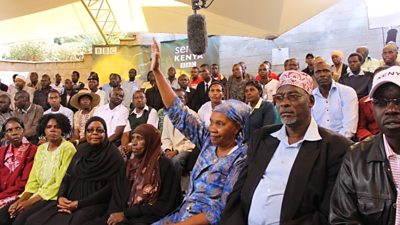Downloads
Publication date: April 2013
Summary
- Sema Kenya (Speak Kenya) is a ����ý Media Action TV and radio programme that aims to provide a constructive platform for Kenyans both to voice their concerns about issues that affect them and to address their politicians and public officials directly. The programme is funded by the UK Department for International Development (DFID) through the Global Grant.
- People who attend the recordings as studio audience members rate the programme very highly and feel it is innovative in giving ordinary citizens a voice at a national level.
- Audience members saw a real value in creating a space to talk about issues that are otherwise brushed over in political coverage and aren’t addressed from multiple perspectives.
Context
The media in Kenya has played an important role in providing forums and platforms for civic engagement with public officials and the state. In the run up to the March 2013 elections, for example, there was a proliferation of programmes that allowed Kenyans to question their leaders. A decade ago radio or TV programmes that allowed Kenyans to ask their leaders questions were unheard of, and that they exist now is a testament how the media space for governance has expanded. However there remains much to be done. In most instances, politicians and public officials are not keen to engage with ordinary Kenyans. Once politicians were voted into their positions, they have tended to have very little to do with their constituents until the next election. There is also an overriding focus on profit-driven programming, which has had the effect of pushing out the types of programmes where Kenyans could engage with their leaders as these programmes tend not to attract advertising.
The project
Sema Kenya is a weekly factual discussion programme broadcast on national TV and radio in the Kiswahili language. The programme provides opportunities for Kenyans all over the country to engage their leaders in dialogue by directly questioning them on important issues that affect their lives. About 100 Kenyan adults from all walks of life attend the recording of each episode as members of the studio audience. Season one of Sema Kenya launched in October 2012 and ran until the end of March 2013. The show will return later in 2013 with a second season. The programme travels around the country with each episode shot in a different location, enabling maximum engagement with diverse audiences. Also, ����ý Media Action has established partnerships with selected radio stations to improve each station’s overall staff capacity to deliver governance programming.
Research methodology
Following the recording of each episode of Sema Kenya audience participants are invited to take part in rapid audience feedback research: each audience participant is provided a self-complete evaluation form and 8-12 are invited to join a focus group discussion to give feedback on their experience. This data provides valuable information on audience impressions of each episode of the programme and supports on-going programme development.
Findings
Audiences were very positive about the programme overall. A number of the audience commented that the format of the programme was innovative in genuinely giving ordinary citizens, from a variety of locations, a space to talk to their leaders.
‘We have never had programmes of this nature; this is the first of its kind. Most are one sided, they focus on only one thing the leaders want; this one is diverse like you can ask on environment, politics. Other programmes don’t reach us, they take place in big hotels and their audience is selective.’ - Audience Member
Many of the audience felt the programme was “eye opening” and a good opportunity to learn something new. Particularly, participants felt it was a good opportunity to learn from other people in their community. Audience members felt that bringing diverse groups together in a moderated space had allowed an honest dialogue about the impact of tribalism in a way that had not been done on a national stage before.
The audience felt it likely that ����ý Sema Kenya would hold leaders to account. They believed that because officials were talking in public spaces and being challenged in a way they were not normally, they would be more accountable to what they said than they had been before. A few audience members commented that to ensure leaders are properly held to account, there would need to be action planned off the back of discussions and a follow-up to revisit whether leaders had acted on issues raised.
Audiences felt that the programme provided more opportunities for grassroots involvement than other political programming.
“This programme is directed at the ordinary citizen, it opens up our minds; it is a miracle to have citizens talk about their issues.” - Audience Member
Audiences were most negative about the choice of panellists and the quality of answers the panellists provided. They felt that the panel choice could be better managed to ensure they are the right people to speak to the issues. However the programme team faced many challenges when the chosen panellists had backed out at the last minute. At the same time, some of the audience were disillusioned with being exposed to leaders whom they found wanting and had found the response they received from leaders during the discussion disappointing.
Implications
The post-programme research shows that there is a real demand for programming that gives ordinary citizens a voice. Audience members saw a real value in creating a space to talk about issues that are otherwise brushed over in political coverage and aren’t addressed from multiple perspectives. The research also highlighted that participating in such a programme can be an educational and enlightening experience.
For more information about our research in Kenya, please see:
